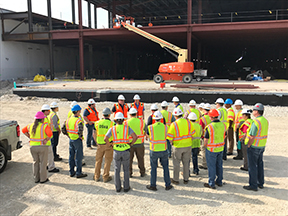07 October 2019
8 Things to Know Before Starting
in the Field


By: Victoria Bankson, Safety Manager
When starting a position in the field, whether you’re fresh out of school, or are starting a new chapter of your career, there are a few things to keep in mind in order to have the smoothest possible transition. Unlike a typical office job, there are many possible hazards and different situations that can arise in the field, so it is important to keep a few key things in mind.
1. Lead by Example
When workers see people of upper management not following the regulations, they are more likely to also change the way they act. For example, if a superintendent or foreman doesn’t wear a hard hat, it may lessen the importance of wearing a hard hat to other workers. Issues like this often start with something small and get more drastic.
2. Discuss Issues Before Jumping to Conclusions
If you notice an issue while completing a safety walk, or when spending time on site, approach the worker in a calm manner. There are a few possibilities as to why a worker might be doing something wrong – it could be lack of knowledge, forgetfulness or choosing not to follow the rules and regulations. Whatever the reason may be, ask the worker “What is your reasoning to approaching the task this way?” From there it is easier to figure out why they are not compliant and the issue can easily be resolved.
3. Understanding Policies and Procedures in the Field
Knowledge of the documentation required for certain activities and how these documents are implemented is key. Although you will learn a lot quickly once you get on-site, it is a good idea to spend some time familiarizing yourself before starting so you can quickly become a go-to person for questions.
4. Communication and Documentation
Work with the project team and subcontractors throughout all phases of the project to ensure that everyone is on the same page. It is important to document issues and take pictures so that patterns can be identified and resolved.
5. The Value of Education and Experience
Employees on a job site will all have varying levels of education and experience. When everyone plays to their strengths and shares their knowledge and perspective, potential incidents can be identified and mitigated and the job will stay on-schedule.
6. Always be Willing to Learn
This doesn’t only apply to graduate degrees or certificates, always look for opportunities to expand your knowledge in all aspects of the industry.
7. How to Handle Conflict
If a worker is noncompliant, it is important to go through all possible options to resolve the issue, and select the solution that will benefit all employees’ safety and efficiency. It is also important to recognize that there are situations where workers are uncooperative and will end up being written up and/or removed from the project if they refuse to comply.
8. Mutual Respect
Make sure the workers know you genuinely care about them and their safety. As a Safety Professional or Superintendent, you do not want to walk around the job site being a tyrant. Tradesmen will respect you and are more likely to be compliant when they see that you care and it is not “just a job”.
About the Author:
Victoria Bankson graduated from Northern Illinois University and has been a Safety Manager for Clune Construction since 2017. Tori is involved in managing all of the Chicagoland area job sites and conducting random safety audits. She, along with the safety director, work to update and improve Clune’s safety training program and continue to maintain Clune’s low EMR score (currently .59) and the trend of over 1 million hours worked with 0 lost days accomplished in 2018.
